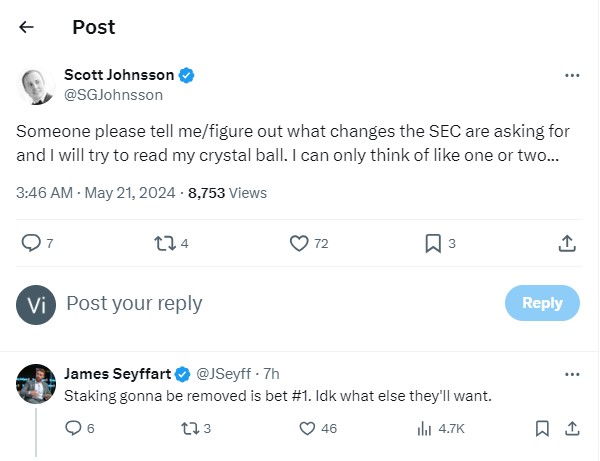ARTICLE AD
The US Securities and Exchange Commission (SEC) may greenlight spot Ethereum exchange-traded funds (ETFs) that do not include the staking feature, suggests Alex Thorn, Head of Research at Galaxy Digital. He believes the SEC would distinguish Ethereum (ETH) and staked ETH in the approval process.
“If the speculation about a 180 from SEC on the Ethereum ETFs is true, I would guess they try to thread a needle between “ETH” NOT being a security and “staked ETH” (or even more flimsily, “staking as a service ETH”) as BEING a security,” he stated.
According to Thorn, by setting clear boundaries between ETH and staked ETH, the SEC could approve spot Ethereum ETFs without contradicting its past actions, including the alleged investigation into the Ethereum Foundation and entities associated with Ethereum, like Consensys.
“In this case and perhaps for other reasons, you would expect [the] SEC to prohibit the ETFs from staking the ETH they hold,” he added.
Recent comments from Bloomberg ETF analysts James Seyffart and Eric Balchunas have fueled the conversation around the SEC’s potential shift in stance.
The two analysts said on Monday that the odds for a spot Ethereum ETF approval had increased to 75%. Balchunas noted that the key factor appears to be a “political issue.”
Commenting on a post by Scott Johnsson, Van Buren Capital’s general partner, regarding the matter, Bloomberg ETF analyst James Seyffart suggested that the removal of staking could be the deciding factor.

The SEC’s decision on VanEck’s spot Ethereum ETF is expected by May 23, and the ARK21 Shares Ethereum ETF’s deadline follows on May 24.
Middle ground
Apart from the latest development, exchanges seeking to list and trade shares of spot Ethereum ETFs have reportedly been asked to revise their 19b-4 filings. This suggests another scenario: the SEC may approve 19b-4s for spot Ethereum ETF but delay S-1 applications.
For an ETF to be approved and begin trading, the issuer needs the SEC to approve two applications: a 19b-4 application, which grants regulatory approval for its listing, and an S-1 application, which lets the ETFs launch and operate fully.
In short, while a 19b-4 might be technically approved without an S-1, the ETF would not be operable without an S-1’s approval. In the case of the Bitcoin ETF, both applications were approved around the same time, allowing trading to commence just a few days later.
The SEC may want to avoid backlash from the crypto community, but it may not be comfortable allowing spot Ethereum ETFs on the market just yet.
To achieve this middle ground, the SEC may consider approving the 19b-4 for the general product but delaying the approval of any specific S-1 applications from issuers. This approach would let the agency effectively stall the launch of specific Ethereum ETFs until further scrutiny.
The SEC’s consideration of spot Ethereum ETFs will occur amid intensifying regulatory scrutiny of crypto in the US.
Crypto has increasingly become a political flashpoint between the two parties that dominate American politics. There have been signs that Democrats are leaning more toward tightening enforcement, though not all Democrats are against crypto. Last Thursday, 21 Democrats joined Republicans in voting for a resolution to overturn the SEC’s Staff Accounting Bulletin No. 121 (SAB 121).
Under the leadership of the Biden administration, the US has been known for its regulatory crackdown on the industry. The US SEC makes itself an example of this skeptical approach. The federal agency’s legal actions against crypto entities have been an ongoing topic of discussion over the past few years.
The information on or accessed through this website is obtained from independent sources we believe to be accurate and reliable, but Decentral Media, Inc. makes no representation or warranty as to the timeliness, completeness, or accuracy of any information on or accessed through this website. Decentral Media, Inc. is not an investment advisor. We do not give personalized investment advice or other financial advice. The information on this website is subject to change without notice. Some or all of the information on this website may become outdated, or it may be or become incomplete or inaccurate. We may, but are not obligated to, update any outdated, incomplete, or inaccurate information.
Crypto Briefing may augment articles with AI-generated content created by Crypto Briefing’s own proprietary AI platform. We use AI as a tool to deliver fast, valuable and actionable information without losing the insight - and oversight - of experienced crypto natives. All AI augmented content is carefully reviewed, including for factural accuracy, by our editors and writers, and always draws from multiple primary and secondary sources when available to create our stories and articles.
You should never make an investment decision on an ICO, IEO, or other investment based on the information on this website, and you should never interpret or otherwise rely on any of the information on this website as investment advice. We strongly recommend that you consult a licensed investment advisor or other qualified financial professional if you are seeking investment advice on an ICO, IEO, or other investment. We do not accept compensation in any form for analyzing or reporting on any ICO, IEO, cryptocurrency, currency, tokenized sales, securities, or commodities.

 7 months ago
49
7 months ago
49 

